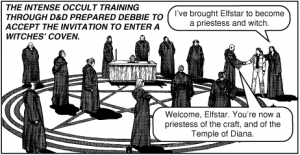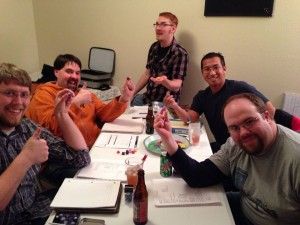

I used to spend my Thursday nights at a friend’s place to play Dungeons & Dragons with the crew. We’d stand in a dark room around a pentagram drawn on the floor, dressed in blood-red robes, chanting ominously in Latin. Adam would walk into the center of the pentagram where a virgin lay on a stone slab and raise his dagger to make the sacrifice…

…And roll a one on his D20 attack roll, to which the DM narrated that his character just stabbed himself. Adam rolled for his damage and took the maximum, which resulted in his character collapsing to the floor bleeding out. Since the rest of the party thought that Adam’s character had been a bit of a jerk, we decided to let his character die so he could be the sacrifice instead. As Adam grumbled about having to make his third character, the DM decided that this would be a good place to stop for the night since we’d have to deal with the demon we had just summoned.
Demon? I mean dragon. A Gold Dragon in fact, which meant that Adam wasn’t alone in the making a new character. Never piss off a lawful-good dragon with a sacrifice.

Despite what many so-called moral guardians believed in the 80’s (and some that still do even in the information age,) Dungeons & Dragons is not some occult training tool. In reality, its a harmless tabletop role-playing game usually set in a world of fantasy not unlike the works of Tolkien. There’s no knives or daggers, with the only weapons being a collection of multi-sided dice. There’s no spellbooks or Necronomicon, instead Players’ Handbooks and character sheets. There’s no ungodly powers at work here, just the power of imagination and improvisation.
Another way you could look at Dungeons & Dragons is as an interactive storytelling game. The DM, or Dungeon Master, is the one “telling” the story while the players are protagonists or, given their chosen alignment, antagonists of the story. The DM has a choice of what kind of story they wish to present, either through a predefined module or crafting they’re own world using the handbooks or whatever supplementary materials are available. The worlds they create can be the standard Tolkien fantasy world or something different like a Steam or Cyberpunk world.

Players build their characters based on the rules of the DM’s world. Under normal circumstances, the players can choose from many races like humans, elves, dwarfs, and hobbi – halflings, as well as fantasy classes such as fighters, paladins, clerics, sorcerers, and so. The choice of alignment is also up to the player but can effect how the party interacts, especially if there’s an evil-aligned character in the same group as a lawful-good paladin. Alignment can come down to how a player plays the character, which can result in a DM forcing an alignment change if the player behaves differently from their chosen alignment. A well-played character can be entertaining but sometimes frustrating, like a certain True Neutral dwarf I remember.
So I imagine the question on people’s mind is how a game like Dungeons & Dragons became, well, demonized? A lot of it has to do with certain groups of people objecting from some of the content, primarily demons even existing as usable monsters and the ability for players to even have an evil alignment, resulting in at least the former being temporarily removed until the drama quieted down. More infamous were the efforts of Patricia Pulling, a mother whose mentally-troubled son committed suicide, which she quickly blamed on Dungeons & Dragons. She formed a group called BADD (Bothered About Dungeons & Dragons – yes, that’s seriously the name,) and somehow managed to become an expert on both Dungeons & Dragons and occult crimes in much the same way Jack Thompson is an expert on video games. Sanity, for the most part, prevailed, with a number of articles like Michael A. Stackpole’s Pulling Report criticizing Pulling’s methods and reasoning, while many studies found that there is no correlation between Dungeons & Dragons and suicide.
The controversy surrounding Dungeons & Dragons has never really stopped people from playing it, with even a number of celebrities getting in on the game. Action star Vin Diesel is probably one of the most notable players, having played for over 20 years and wrote the foreword for the book Thirty Years of Adventure, stating that the game was “a training ground for our imagination and an opportunity to explore our own identities.” He passed the time playing the game alongside fellow player Karl Urban and Judi Dench on the set of The Chronicles of Riddick and joined comedians Mike Myers and Robin Williams for 2006’s Dungeons & Dragons Game Day in London. Another famous individual is comedian Stephen Colbert has been playing almost since its inception and credits it for his ability to act and improvise. Director Jon Favreau was also known to have played the game, stating “it gave me a really strong background in imagination, storytelling, understanding how to create tone and a sense of balance.”
Its been quite some time since I’ve been able to play Dungeons & Dragons. I’m not great when it comes to playing my characters or being put on the spot, though the early days of my last character, a fourth-wall breaking halfling fighter named Punchy McFistacuffs, weren’t too bad. Being part of a game helped me socialize a little better as well as have people around during some of the rougher times. I’ve actually wanted to do a campaign, probably with dinosaurs since everything’s better with dinosaurs, and I might give it a try when things settle down.
If you still need an idea of what Dungeons & Dragons is like, I’d recommend watching the Gamers series, mainly The Gamers: Dorkness Rising. The movie features a group of gamers playing through a campaign in the fashion adult gamers might, though the campaign itself takes much less time than a normal campaign would. If you’re still not convinced, try tracking down an actual group of players and sitting in on a few sessions. Just do me a favor and don’t going blindly judging the game without actually knowing what its actually like; too many good things get ruined that way.
Dungeons & Dragons Official Site
Dungeon Masters Guild

